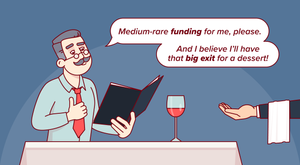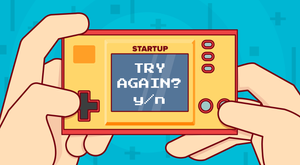Find this helpful?
This is just a small sample! Register to unlock our in-depth courses, hundreds of video courses, and a library of playbooks and articles to grow your startup fast. Let us Let us show you!
Submission confirms agreement to our Terms of Service and Privacy Policy.
Already a member? Login
AI Generated Transcript
Ryan Rutan: Welcome back to the episode of the startup therapy podcast. This is Ryan Rotan joined as always by Will Schroeder, my friend, the founder and CEO of startups dot com. Will we love to stare at the ceiling until all hours of the night as founders worried about things from A to Z and beyond, how do we escape this? How often are we making a mole hill into a mountain? And what can we do about this man? Like how do we, how do we get out of this trap? It's
Wil Schroter: all bullshit. I mean, that, that's what it comes down to.
Ryan Rutan: It's all bullshit and it's bad for you.
Wil Schroter: Well, right. I know that's the thing like we treat it as if it's actually happening. We sit there and we think of every possible outcome that could go wrong. And instead of saying, ok, these are the things that have actually gone wrong. We spend the entire night talking about or thinking about what might go wrong. And the irony is all the time that we spend on all of these, what we're gonna call paper demons, these flimsy kind of, you know, intangible demons that we create for ourselves is actually the energy. In this case, the sleep we need to go actually prevent those outcomes. So it's almost like we're so worried about these outcomes, but it's the very act of worrying, which is what drives these outcomes. So what I'm hoping we can kind of dig into today and unpack a bit is what are those kind of paper demons that all of us seem to create? And by the way, it's all founders, right? So it's not that one. No one seems to
Ryan Rutan: be immune to this. No.
Wil Schroter: Exactly. But I wanna just decouple this a bit from reality and talk about why all the stuff you think is only in your head right now is in everyone's head and now it's universally bullshit. So we can at least take it down a notch and conserve a little bit of energy to actually building startups, you know, who to get.
Ryan Rutan: Yeah. It's funny. It occurs to me that the same superpower that we use to imagine that a company with zero revenue is always gonna hit a billion dollars by year three so that we can satisfy our, our needs to fill up the spreadsheets. When we're building our business plan, we apply the same mathematics to our problems, right? We take something that is insanely small and probably relatively simple to solve. And we just apply all of this exponential math that has no place in that decision matrix and things just get out of control, super, super
Wil Schroter: fast. It's dangerous too because I think what, what ends up happening is like I said, we're so distracted with what might happen that we lose sight of what's actually happening. And I think in this case, particularly with startups because we have so many things that we need to be on top of, we don't have these extra cycles. And I think this whole concept of worrying for the sake of worrying, which is by the way, like how startups are built just, just to be clear, what I'm saying is let's do this better. And here's how here are the different things that are keeping you up at night and why they're just kind of completely false and, or way blown out of proportion. The first thing I would say is that if things go wrong, my investors are going to revolt to be clear, to be clear, your investors will not be happy, right? If things go sideways. But I think in our mind what that scenario looks like, especially if you've never had them before is way worse, way worse than anything close to the reality. Yet. We spend an ungodly amount of time thinking about it. You know what I
Ryan Rutan: mean? Oh, sure. In our minds it's, it's pitch forks and, and being burnt alive at the stake. Right. In reality, it was a terse phone call, right. But in, in the moments between whatever it was that happened, it's going to upset these folks and that conversation transpiring, we allow it to grow out of size, right? And we, we talked about this a couple of months ago about these, these sort of one sided conversations and how often these occur and how bad this is for everything because we, we start making decisions based on answers. We got back from people that we never actually talk to. We start to allow uh the data to go out the window and our imagination to, to paint all of the, the future for the startup company. And we start to make really different decisions, right? You touched on the fact that, you know, this can waste our energy, drain us emotionally mentally, physically. But if we also start to believe in some of this hyperbolic nonsense that we're creating out of thin air, we start to make different decisions based on that and be like, well, we, we can't possibly market because doomsday is coming. You know, we can't possibly hire anyone because dooms day is coming. Well, like you said, that can become a self fulfilling prophecy if we start to make decisions according to Nonda. And yet, like you also said, we all do this, we all do this. We do
Wil Schroter: it a lot. And I think if, if we play out the reality, if things go sideways, will our investors react? Yes, they have to. That is their job as part of the board, as part of the investment scenario that they have to react. Just not the way we think the the part that we always overlook is we always look at these investors, many people, but certainly the investors as these one dimensional cardboard cut out kind of characters that only care about the bottom line. The
Ryan Rutan: ham fisted monocle guy pounding the desk in the boardroom. Right. Yeah.
Wil Schroter: And while part of that is true, the part we completely skip over the part we completely overlook is the fact that those same people also in many ways care about us or at least care for us in a certain way that when things are going south, they have some level of empathy and, or sympathy to how things are going and usually when they're going south, so is our health. So is our well-being. And so while we're driving ourselves into the ground killing ourselves, we're thinking investors are thinking, hey, that's wonderful. That's exactly what I want you to do. It's never the case. No, it's not. And by the way, if it is the case that they do feel that way, they do want you to run yourself in the ground. Fuck those guys.
Ryan Rutan: Yeah. Right. Seriously. Seriously, they, they can, they can get what they get at that point.
Wil Schroter: I'm not gonna worry about those guys at all because they're not worried about me. And so my thought with this, with regard to the investors revolting is, will investors push back Yes, it's just never the level we think it's going to be, we think it's gonna be this knockdown, drag out horrible fight in many cases. I'll give you one scenario in many cases. Let's say that we're gonna have to shut the company down. Do the investors go insane. They're not happy about it, but it's like 10 minutes of conversation. Frankly, there's just not a lot to talk about and they get it and they saw it coming a year out. None of this is a surprise to them. Even if they act a little bit surprised. You kind of know when things are going well, but we're gonna spend every waking moment killing ourselves over it if we were to look at it in reality, right? If we were to, just to say what's actually going to happen, well, I'm gonna have five maybe difficult conversations with some investors to tell them what happened and that'll be the end of it. It'll literally be a tough day all of this time that I'm spending all of this massive kind of scenario I've built is tantamount to essentially a single day of tough phone calls. And here's the other trick, they might not even be tough phone calls might be tough to initiate, but most people are just good people. They want to make sure you're healthy that, hey, look, sorry, it didn't work out, you know, let's figure it out the next time. Very different than what people expect, you know what I mean? Yeah. Yeah, I
Ryan Rutan: think that, yeah, we, we blow these things way out of proportion and like you said, they do have some level of care for you. Even if we boil it down to a completely self serving notion they gave you money, they want to see you succeed. Right. It's very rare that investors like ha ha, they're down, let's kick them, let's make this worse. Right. Let's see what we can do to ensure that our investment will be squandered. It's just not gonna happen. Right. And, and nor are these phone calls? What you think? Because I think that even if we say like, look, this isn't like some massive, you know, horrible thing is gonna happen. It's five phone calls. You can still like, just to, to point out, right? Even even that we can imagine these to be really horrible, you know, like we're tarred and feathered in stocks and having to conduct this, this conversation in the center of town for all of the public to see. It's not like that. Right. We've been through these things. It's just not nearly as bad as your imagination. We'll want it to be right. It just isn't
Wil Schroter: right. But you said that you were tar and feather like our, our career is gonna be ruined, our reputation is gonna be ruined. Here's how we think about it. This is the paper demon. We create paper demon, which is always massive at imposing, says that when this doesn't work, when this startup doesn't work, I am branded for life as the founder that couldn't make their startup work. Here's the funny thing. If you talk to enough successful founders, you're gonna find almost all of them have failed. Think about it for a second. We're so convinced that our singular failure is going to destroy us for life. When every indication of every successful founder who's also had failure suggests exactly the opposite. What does it suggest? It's not the book. It's a chapter in the book and sometimes lo and behold, it's a forgotten chapter. It's
Ryan Rutan: a chapter in the book, right? It's one game in the season. It's, you know, analogies it however you want and we even hear this from the the investor narrative side, right? So we'll even hear investors say some version of the following, which is I prefer to invest in founders who've already failed. I want to see somebody who's done something and been through that so that I know that they have the perseverance to come through and guess what? They probably learned a hell of a lot through that adventure of failure and they probably won't make some of the same mistakes again or they'll recognize them earlier on. So, yeah, this is all, this is all part of it, right? Nobody's nobody thinks that you're gonna just start and win every game you've ever played, right? Not the expectation
Wil Schroter: let's play it out. So I'm at the end of my rope with my startup, I feel like things are gonna fail. So in my mind, my career clearly cannot move forward. Right. Uh Again, everyone just to remind me that, remember me as the person who didn't work out whatever. OK. What we forget in that moment. And often too when we're very early in our careers because we haven't been around on the planet long enough to see what the other side of this is that no one cares. And I know we did an episode on this where we said no one actually
Ryan Rutan: cares. Nobody gives a shit. No, in
Wil Schroter: our minds, we're like, are you, what are you talking about? You're out of your mind. My investors care, my uh friends care, my employees care, my customers care. They do today. They care today for like a week, maybe a month. I guarantee within a month, no one even remembers this happened or cares they're off to do something else. They told their story blew off their steam. Whatever investors aren't thinking twice about it. No investor sits around saying, oh, it's been a year. I still can't believe will and Ryan shut that thing down. I mean, they've forgotten about it by dinner time. And so I think when we have this idea of our career being over what we lose when we create this, this demon is the fact that it's not like our career stops. It wasn't our final game. Right. We're going on and get it. We're gonna do another one after that, another one after that and another one after that, be it, regular employment or a startup, et cetera. And this is one moment in time. It's a shitty moment in time. Right. We've all had them, but it's a moment in time. It will pass. It always does. The difference is, I think this is the, the, the posterity part. We believe everyone else is so consumed with our lives and me and my career that they're sitting around thinking about it forever. Someone saw a Facebook post or a Twitter like a tweet or whatever for maybe one second flipped right past it and never thought about it again. That's your career in other people's eyes.
Ryan Rutan: Exactly. Right. And these are people that know you, these are your friends, right? It's like we think that these moments just get memorialized forever that we're going to carry around this, this standard with a, you know, that says like, you know, I I'm a, I'm a startup failure. It just doesn't work that way, right? People will remember you until you do the next thing. And by the way, the next thing might be like showing up at a mutual friend's barbecue that will now become the new thing for them. It doesn't take some monumentous thing to erase this. It takes one more interaction of any sort. And now that becomes the thing they remember, right. We're simple creatures. People
Wil Schroter: will remember your last thing. So the key is to, to make this not your last thing as fast as possible, right? So, yeah, if things go sideways, go do something else, whatever it is, one to keep your mind off it put positive energy in the world. But two, when you see somebody at, at an event or, you know, you're updating, people talk about the new thing, right? It's kind of hard to harp on the old thing if you're on the new thing. And so we talked about this in a like one of the first episodes which is about reloading. If we've got this idea that oh my God, everything's gonna go wrong. My career is over. No, the answer to that to you to dispatch that paper demon is to say, I don't know what the next thing is gonna be, but there's going to be a next thing and that's when all that's going to go away. If you can see an end to it, you can dispatch it. You know what I mean?
Ryan Rutan: I don't know. I'm kind of picturing in an old, old timey Bard, walking around with a loot playing a really sad song and lamenting the the forever failed founder. Now it seems far more romantic.
Wil Schroter: I would fail a startup just to get my own Bard uh with his own loop, right? That sounds great. I had some witcher to move. You know, something that's really funny about everything we talk about here is that none of it is new. Everything you're dealing with right now has been done 1000 times before you, which means the answer already exists. You may just not know it, but that's ok. That's kind of what we're here to do. We talk about this stuff on the show, but we actually solve these problems all day long at groups dot startups dot com. So if any of this sounds familiar, stop guessing about what to do, let us just give you the answers to the test and be done with it. What else do you say when you think about those different demons that, that we're creating? What, what other ones do you see that are popular?
Ryan Rutan: So the theme so far has been kind of the cataclysmic ones right there, there's a ton of them, right? So we can go off, we can veer off into like the tiny little ones like each hire each, firing each, every little thing that we do tends to have this, right? I wanna, I wanna bring up a point. I do this typically in the name of analysis, right? I tell myself I'm just analyzing things, right? Well, beyond the point of any return on that time investment. So we have to be careful of this. But since we're sticking with the cataclysmic here competition, right? This is a big one, people think Right. You know, uh, my competition is gonna come in, they're gonna crush me. Right. They, oh, these, somebody else started something brand new and now they're here at the same time and yet I believe that they're gonna do better than we are for absolutely no objective reason. And that's going to be what kills us. This is why I need to stay up all night, every night for the next forever. And it's just, again, one of those things tends not to be true, particularly like if you're in a startup, you're trying to solve some problem that's never been solved before. So even if two people are trying to solve it at the same time, what are the chances that you're going to saturate that market? Right? At the same time, you're not competing against each other, you're competing against
Wil Schroter: yourselves in the market, right? I mean, ultimately, your customers don't care what your competition is doing. They, they, they care that what you're doing. In other words, no one's saying I really want to buy this competitor's product, but I won't because, you know, they didn't raise enough money or they didn't, you know, they didn't hire that one person or, or their Twitter following isn't big enough, right? Like all of the dumb shit that we kind of get hung up on as founders as what the competition is where we lose sight of this is that the people that matter are customers that's not what they're worried about. Also, we keep thinking that it's always a winner, take all market, how many winner take all markets are there or have there been? Right? Not really. I'll give you an example in the eighties. For those of you that don't remember the Windows became popular, right? When it became popular, it became the dominant operating system across all P CS. At one point, it had like 95% market share. You quite literally can't be more dominant, right? In a bigger company in that time, in that industry, et cetera. So as far as anyone was concerned, any other operating system, any other comp company, whatever, just in that space was doomed. And yet here we are and it turns out well, I guess there was only one other company but that company did fairly well. Most company, right, actually stick with that though. Apple is considered it, it changes by the day anymore. One of the most valuable companies on the planet who was vying for less than 5% market share to this day has, I don't know what they have 10% 11% point being right point being even at 11% they're worth more than the dominant player. Second point being markets don't end with one company. In fact, they flourish when one company has too much, they flourish. When other people find there's other ways to kind of, you know, unseat those folks
Ryan Rutan: alternatives. I mean, hell we even have legislation that keeps this from happening in the first place. People. It's
Wil Schroter: amazing. It's amazing. And yet we all believe that because we have competition that we will be stomped out as if there's only one tiny square to play on. And if you're not king of the mountain on that one king, you just cannot play. Turns
Ryan Rutan: out there's some really nice hillside.
Wil Schroter: Yeah. Here's a crazy way to dispatch that demon. Think about it like this. It'd be cool if we were the biggest. But you know, it'd be also be awesome if we do a really good job with our customers. Build an amazing business, create amazing lives for all the people around us and really enjoy ourselves. Imagine that outcome. Too easy, too easy. Sounds pretty fun. Right. But I, again, I think that the, the novelty of the demon is that competition erases us if they're so good, all of their competition just ceases and leaves the market. And that's actually just not how markets work at all, even though we know that we actually believe that our safety and longevity if you will is existentially threatened by competition, which kind of never proves to be true. You know what I mean?
Ryan Rutan: Yeah. No, I mean, certainly the markets historically have shown us that that's not the case, right? There are lots of things that will lend a company. It's not usually your competition, at least not directly, right? And again, like some of these are bad decisions that we make based on our competition, but not necessarily based on the reality of the competition, right? It's based on, we need to do this so that we can stand out or differentiate ourselves from these folks. Instead of just saying this is what our customers actually wanted. This is what they can, you need to pay us for. This is what we're really good at. Let's just keep doing that instead of trying to end around a competitor that doesn't actually exist in terms of true competition, right? So we, we're both kind of making this point subtly, there are massive markets in most cases and the idea that anybody's going to absorb all of it is ludicrous the idea that even if we only absorb a tiny percentage because this is the other funny thing about this one to me. Well, how often do you hear? And we're just gonna just, we just need to get 1% of the market. How often do you hear this thing about like 1% of the market or 10.5% of the market? Right? That founder comes in and says, all we need to do is get 1% of the market and then we're gonna be huge, we're gonna be big, we're gonna be this, we're gonna do that four years later when they have 5% of the market and they don't have 100% of the market. They're scared to death. Right. What happened to that optimist who just needed 1% of that market? I missed that guy.
Wil Schroter: Well, I think where this becomes dangerous is we get so hung up on what our competition is doing. Every one of those cycles comes at the expense of what we're doing. Where we should be focused with our time is I should be laying in bed at night from, I'm worried about anything. I should lay in bed at night thinking how do I make my product better. Competition is doing whatever to do? Nice footnote, good to know. But if my product isn't better, if I'm not spending all my time, those four am moments thinking about how to make my product better, that I'm gonna lose the competition no matter what. Like however you consider a loss. I'm just saying in this case, it is very rarely existential loss, but we project it as such. Every founder I know says to themselves, if my competition wins, I lose, it's one or the other. Either they get it all or I get it all and nobody else gets anything else. It just never actually happens, which is the, the mind blowing part that folks don't really seem to get their heads around, you know.
Ryan Rutan: Yeah. And because we continue to create these things, right? The bogeyman still exists, whether it's competition or, you know, fundraising or whatever, uh whatever that next thing that we have now decided is the most absolute important thing. And look, it might be a very important thing. We're not taking away from any of these particular issues, but keep them in perspective. Right. I, I think that, you know, it's, it's the challenge of the founder, we're constantly asked to use our imaginations to see things that don't yet exist. But boy does that cut both ways when we start to imagine problems that don't exist or imagine them to be bigger than they really are. It's super important that we keep that perspective and and then we treat them with appropriate respect, right? Like look at the problems, analyze them for what they are, name them, place them in the hierarchy of things that we need to get done and then go get shit done, right? We've, we've talked about this already, but it's super important to remember that when we spend time worrying and just worrying and worrying and worrying, particularly about things like competition that we have no control over or what the markets are doing right now, which we have no control over, right? We are all affected by them and the markets more so than competition and the markets as a whole. Right now, the financial markets are still a bit of a basket case as of the recording of this episode. And so yes, we have to take these things into account, but we can't let them take control of our time. We can't let them take control of our actions. We still have to go out and do the things to your point that will make a better product, that will make our customers happy, that will build better teams. These things are always in vogue, right? They will never go out of style and start up land. If you can do those things, regardless of what else is going on, you will be in ok shape, right? The minute we start to allow these paper demons to take over our thinking to take over our actions, we've already started to lose. It becomes a self fulfilling prophecy that those will become our biggest problems simply by virtue of spending and wasting our time on them.
Wil Schroter: I agree. There's a technique that I learned a long time ago in how to deal with this. And I, I'm sure folks, I think this
Ryan Rutan: involves a Jedi will or I'm gonna be disappointed
Wil Schroter: it does. Here's what we do when our anxiety gets out of control, which it almost always is we have a couple options. One, we have to step back and recognize that it's, in fact, anxiety, anxiety is a thing unto itself and I know folks kind of know this, but I want to reiterate this. Everyone has it, but it doesn't matter. It's like whack a mole. It doesn't matter what part of anxiety you're stressing about right now. If it's not staff issues, it's gonna be financing issues. If it's not financing issues it's gonna be marketing. It doesn't matter. The point is it's this ball of anxiety that is just this vortex pulling you in trying to take all of your precious cycles and no matter what it's always going to be there, you can't make it go away. I know there's a whole bunch of therapy that would, that would tell us otherwise you can't make it go away, but you can manage toward it one way to manage toward it. Like I said, is to start off by recognizing that it does exist. OK. This is my anxiety. It's firing up where I am. Here, we go again and say to yourself no matter what I think or how much more I analyze this. It actually won't matter. Hard to, hard to do that at the moment because it feels like it matters. What I'm telling you is you have to get in the habit of saying this is just anxiety. It's not great. I feel terrible. Keep me up et cetera, but it's not going to go away. The only thing I can change is what I do about it. One thing to do about it, make a list of what to do. Let me give you an example. People often say, oh, we're gonna run out of money. I'm stressing about that. Investors gonna et cetera. Well, my only thing I can do is raise more money. The moment you put that on your list, you're re because you can't actually do it. Right. I look for things that I can do within the next hour. Ideally not a for him. But what are the things that I can do in short supply to chip away at the problem? The problem is we think about it in terms of, again, massive problem requires massive singular response. And that sounds awesome. It's a, it's actually impossible to actually do. So instead what are the things I can do to chip away at it? Here are things I can do if I'm looking to raise money and we're gonna run out of money, I can say tomorrow morning as soon as I get up, I'm gonna research 10 new investors and I'm gonna add them to my list. That's my focal point. That's it. Nothing else. That's how I'm gonna move things just a little bit forward. I know I can't boil the ocean, fix the whole problem, but I can pick away at it. Two things happen when you do that. That are absolutely fantastic. The first thing is you actually have a handle on it. You put your energy where it's supposed to be, which is moving the ball forward. The second thing is it gives you a mechanism to actually start to drown out that anxiety so you can go get stuff done, which is exactly what helps you prevent those problems in the first place. So to reiterate call anxiety, what it is when it happens look at it and say this is just yet another bout, I'm gonna have it tomorrow, I'm gonna have it the next day. So it's nothing new. It's gonna happen. Tell yourself that the only way to deal with this is to find something to do that's small enough that I can do in an hour and a day, et cetera that I can chip away at it. And the third thing is focus on doing that, get super focused on that one thing so that you can put blinders on toward everything else because right about now, blinders is exactly what you need. So in addition to all the stuff related to founder groups, you've also got full access to everything on startups dot com. That includes all of our education tracks, which will be funding customer acquisition, even how to manage your monthly finances. They're so much stuff in there. All of our software including BIZ plan for putting together detailed business plans and financials launch rock for attracting early customers and of course, fund for attracting investment capital. When you log into the startups dot com site, you'll find all of these resources available.
No comments yet.
Start a Membership to join the discussion.
Already a member? Login



































































































